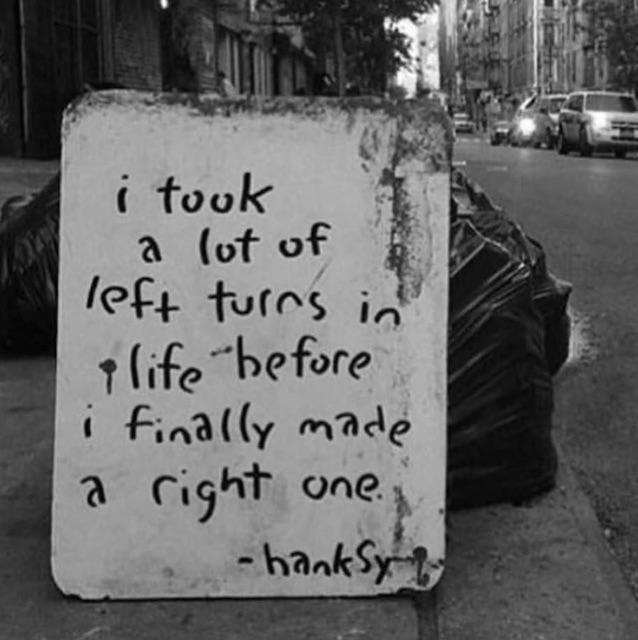
“The truth is what works.” ~ William James
~
We live in a postmodern age where so many of us are rejecting the assumptions and beliefs of the past.
This is good because, in my opinion, a lot of our traditions are useless and dangerous. Here are a couple of places where Western tradition has failed us: historical racism, dogmatic religion, oppression of women, and the destruction of the environment.
We could do without these things.
But it is also bad because a lot of our traditions are valuable, like the legal recognition of the individual, the scientific method, and the fact that we are not in a state of complete genocidal chaos.
Can we start by admitting that our culture has gotten some things right and that maybe we shouldn’t secretly wish for a communist revolution? Okay, cool.
So, if some traditions are useful and others are not, how do we know what is “true“?
The postmodern man would say that there’s an infinite number of ways we can interpret the world, so the concept of truth is not just useless but probably a tyrannical imposition by privileged patriarchs. Great—what a fun world to live in.
I look at things a little differently. I believe in truth, which means that I think there is a “right” way to be. Maybe this is what all religions point toward, but they get too stuck in their own rigid structure to really convince a lot of us to believe in them.
Most millenials might not buy into the idea that there is a “right” way to be or that there is such a thing as “truth.” They might believe it’s all a matter of perspective or a power play. But let me pose a question: if there is no such thing as a “right” way to be, then why strive for anything? Why try to improve any aspect of our lives?
When we attempt to improve ourselves in any way, we are implicitly acknowledging that there is a “right” way to be—or a manner of being that is more “right” than another.
What does it mean for something to be “right”? I believe it means we are lessening suffering to the greatest degree that we can. And if we don’t believe in being “right,” then we are basically saying that there’s nothing we can do about suffering.
That doesn’t fly with me.
I believe that “truth” is what works—not just today, but tomorrow, next year, and 20 years from now. And not just for ourselves, but for our family, friends, and the world at large. Truth, to me, is the mode of being that lessens suffering as much as possible over the longest period of time.
There is no absolute truth, but there are manners of being that are more true than others. We judge this by how much suffering is caused to ourselves and those around us over the biggest chunk of time. For example, learning to forgive people is generally a useful life tool, so there is something “true” about forgiveness. It speaks to a deeper element of who we are.
The problem with living in this postmodern age is that people are so skeptical of the grand narratives of the past that they write off all narratives—meaning and truth, altogether. This is all fine and dandy, until we start to suffer.
Having lived with a chronic illness for the past five years, I’ve suffered more than many of my peers, so there has been a deeper reason for me to seek out truth. If we are young and healthy, then we can afford to be cynical and nihilistic—but it doesn’t work out for us in the long run.
There is a such thing as truth in this world, and if we attempt to embrace it, our lives will improve. Or at least that has been my experience. We don’t necessarily need God or ideology. What we truly need is to be honest with ourselves and pursue the things that are “right” and that make us feel best. This is the path of truth.
So how do we live truthfully? Start with these tools:
1. Question everything. Always assume that there is something we do not know or are not acknowledging in any given situation. Never be too certain.
2. Meditate. Find ways of connecting with the present moment, whether it be a breathing technique, some form of daily mindfulness practice, or a deep contemplative exercise.
3. Appreciate art. Find creators throughout history who have uncovered truth and absorb what they have to offer. Read good books. Look at paintings. Listen to great music.
4. Express yourself. Emulate these powerful creators and find artistic outlets. Write things down. Draw a little bit. Art is the language of the soul, which connects us with truth.
5. Don’t get bogged down. Life is suffering, but that doesn’t mean we should allow ourselves to be pathological. We need to be aware of when we’re justifying bad decisions and learn to take responsibility for our lives. Be open and inquisitive.
It is easy to be just another whiny millennial. Don’t do it—find truth instead.
https://www.youtube.com/watch?v=HKg2NsGTHww
~
~
Author: Samuel Kronen
Image: @ecofolks/Instagram
Editor: Nicole Cameron
Copy Editor: Catherine Monkman


 Share on bsky
Share on bsky




Read 0 comments and reply